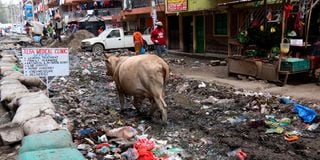Legal Clinic: Right to a clean environment

A pile of uncollected garbage lies on the street between buildings in Pipeline, Nairobi on June 12, 2022.
The world water conference concluded last week in New York with beautiful speeches and bountiful promises. This was in commemoration of the international world water day, ritualistically held on March 22nd every year.
Water is not just a commodity for survival, it is a human right for everyone. Many governments and people gather to acknowledge that natural resources and generations are two worlds apart for a lack of commitment to a culture of sustainable development.
It is arguable to say the country is rich and carries a robust legal and policy framework, which supports an attendant institutional regime to govern the water sector.
The Constitution provides the right to clean and safe water of acceptable quality standards. This is captured in Article 43 (1-d). It is also important to note that Article 42 provides everyone with the right to a clean and healthy environment, including the promotion of sustainable utilisation of resources that considers the needs and demands of today against those of the future to strike a balance of generational and regeneration interests.
This is well-written and calls for enforcement by the state. History shows how this country has to a large extent succeeded partially only to effectively serve those economically endowed than others. The challenges experienced in Kenya's water sector are evidence of the inequalities and inequities that separate communities, geographies, and generations in what tends to look like a class war. We are reminded that many mistakes have been made in the past that must be addressed legally, socially, and significantly politically to return safe and quality water to the table, bathrooms, and kitchens of all Kenyans.
Estimates show 28million Kenyans lack access to safe drinking and cooking water, while forty-one million lack access to improved sanitation. These Kenyans' water scarcity experiences demonstrate the diverse water injustice faces. A pastoralist in Wajir cries over pasture and thirst. A woman in Lodwar faces domestic violence for not providing her husband water for bathing and eating.
A street-connected child in Nairobi and other urban centres likely suffers from constant dehydration because public water taps are dry and commercialized. Women and girls in the various slums probably face sexual exploitation to access water considered scarce and expensive. Fisher folk in Kisumu, Lamu, and Baringo is food insecure since water levels in the lakes and rivers have dwindled by over 50% compared to fifty years back.
The water problem cuts across communities, villages, age groups, and generations. Improving access to water has eluded many successive governments, even though considerable progress has been made. Nonetheless, disparities persist. What could be the problem? Climate change has caught up with man, following selfish approaches to business and development. One can argue there is the Climate Change Council in the country courtesy of the Climate Change Act of 2016.
Others may also pick out the Ministry of Water, which has been with us since independence, whose implementation is guided by the Water Act of 2016. Water and climate change as functions of the government are devolved as indicated in the Fourth Schedule of the Constitution and has county-specific statutes.
Yet there is a problem to be arrested so that discrimination in access to water is reduced. Could this be a case of contradictions in the many laws governing water and other natural resources? Is it likely that coordination between institutions at the national and county levels needs to be stronger or more present? Is it possible that communities must consider the practices predisposing them to water inconsistency? Or is it a case of the state relying on the law of progressive realization of economic rights?
It should be a good thing for the state to align its thinking programming and financing to the thoughts of Justice Isaac Lenaola, who in 2013, whose paragraph 21 of his judgement in Petition 133 of 2013, said, "let this judgment, therefore, be a wakeup call to the Respondents that Article 43 of the Constitution does not sit there like a defected football player who has lost a match. It is indeed alive and has started the run towards full realisation as opposed to a slow shuffle in the name of progressive realisation."
A few drawbacks may have contributed to the country being where it is today. First is the concern of human settlements allowed in some of the water towers in Kenya, such as Mau, and the blatant deforestation that subsequently followed during the Late President Moi's Regime. Second is the unashamed abuse of buildings and road construction codes, which largely led to the destruction of wet and riparian lands.
Third is the allegation of corruption that, in the first place, allowed the thriving of underhand deals that offended the environment. All these have happened in the presence of the National Management and Environmental Authority, the Kenya Water Towers Agency, the many water and sewerage companies, and regional water bodies such as the Coast Water Service Board.
Lastly, this lamentation takes note of Article 69 (1-b), which says that the state shall work to achieve and maintain a tree cover of at least ten percent of the land area of Kenya. The call by the current Kenyan government to allow people to settle and till in the forests has ignored this aspect of the law because, as a country, we carry with us the burden of poor compliance and enforcement.
Let the water right be an urgency that all people address, lest we leave others behind, contrary to SDG 16. Remember, world meteorological day is just a day after world water day. What a coincidence!
Eric Mukoya has over 17 years’ experience working in the social justice sector. He’s the executive director of Undugu Society of Kenya. Legal query? Email [email protected]





